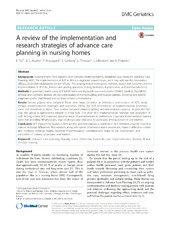| dc.description.abstract | Background Nursing home (NH) patients have complex health problems, disabilities and needs for Advance Care Planning (ACP). The implementation of ACP in NHs is a neglected research topic, yet it may optimize the intervention efficacy, or provide explanations for low efficacy. This scoping review investigates methods, design and outcomes and the implementation of ACP (i.e., themes and guiding questions, setting, facilitators, implementers, and promoters/barriers). Methods A systematic search using ACP MESH terms and keywords was conducted in CINAHL, Medline, PsychINFO, Embase and Cochrane libraries. We excluded studies on home-dwelling and hospital patients, including only specific diagnoses and/or chart-based interventions without conversations. Results Sixteen papers were included. There were large variations in definitions and content of ACP, study design, implementation strategies and outcomes. Often, the ACP intervention or implementation processes were not described in detail. Few studies included patients lacking decision-making capacity, despite the fact that this group is significantly present in most NHs. The chief ACP implementation strategy was education of staff. Among others, ACP improved documentation of and adherence to preferences. Important implementation barriers were non-attending NH physicians, legal challenges and reluctance to participate among personnel and relatives. Conclusion ACP intervention studies in NHs are few and heterogeneous. Variation in ACP definitions may be related to cultural and legal differences. This variation, along with sparse information about procedures, makes it difficult to collate and compare research results. Essential implementation considerations relate to the involvement and education of nurses, physicians and leaders. | en_US |

